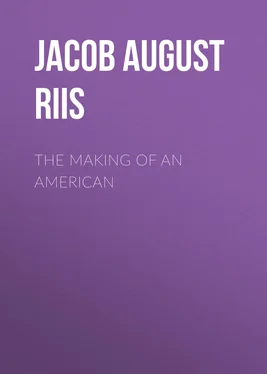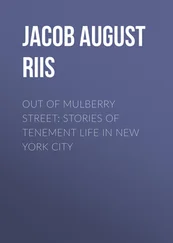Jacob August Riis - The Making of an American
Здесь есть возможность читать онлайн «Jacob August Riis - The Making of an American» — ознакомительный отрывок электронной книги совершенно бесплатно, а после прочтения отрывка купить полную версию. В некоторых случаях можно слушать аудио, скачать через торрент в формате fb2 и присутствует краткое содержание. Жанр: Биографии и Мемуары, История, foreign_edu, foreign_antique, foreign_prose, на английском языке. Описание произведения, (предисловие) а так же отзывы посетителей доступны на портале библиотеки ЛибКат.
- Название:The Making of an American
- Автор:
- Жанр:
- Год:неизвестен
- ISBN:нет данных
- Рейтинг книги:5 / 5. Голосов: 1
-
Избранное:Добавить в избранное
- Отзывы:
-
Ваша оценка:
- 100
- 1
- 2
- 3
- 4
- 5
The Making of an American: краткое содержание, описание и аннотация
Предлагаем к чтению аннотацию, описание, краткое содержание или предисловие (зависит от того, что написал сам автор книги «The Making of an American»). Если вы не нашли необходимую информацию о книге — напишите в комментариях, мы постараемся отыскать её.
The Making of an American — читать онлайн ознакомительный отрывок
Ниже представлен текст книги, разбитый по страницам. Система сохранения места последней прочитанной страницы, позволяет с удобством читать онлайн бесплатно книгу «The Making of an American», без необходимости каждый раз заново искать на чём Вы остановились. Поставьте закладку, и сможете в любой момент перейти на страницу, на которой закончили чтение.
Интервал:
Закладка:
The years passed, and the day came at last when, having proved my fitness, I received my certificate as a duly enrolled carpenter of the guild of Copenhagen, and, dropping my tools joyfully and in haste, made a bee-line for Ribe, where she was. I thought that I had moved with very stealthy steps toward my goal, having grown four years older than at the time I set the whole community by the ears. But it could not have been so, for I had not been twenty-four hours in town before it was all over that I had come home to propose to Elizabeth; which was annoying but true. By the same sort of sorcery the town knew in another day that she had refused me, and all the wise heads wagged and bore witness that they could have told me so. What did I, a common carpenter, want at the "castle"? That was what they called her father's house. He had other plans for his pretty daughter.
As for Elizabeth, poor child! she was not yet seventeen, and was easily persuaded that it was all wrong; she wept, and in the goodness of her gentle heart was truly sorry; and I kissed her hands and went out, my eyes brimming over with tears, feeling that there was nothing in all the wide world for me any more, and that the farther I went from her the better. So it was settled that I should go to America. Her mother gave me a picture of her and a lock of her hair, and thereby roused the wrath of the dowagers once more; for why should I be breaking my heart over Elizabeth in foreign parts, since she was not for me? Ah, but mothers know better! I lived on that picture and that curl six long years.
One May morning my own mother went to the stagecoach with me to see me off on my long journey. Father stayed home. He was ever a man who, with the tenderest of hearts, put on an appearance of great sternness lest he betray it. God rest his soul! That nothing that I have done caused him greater grief in his life than the separation that day is sweet comfort to me now. He lived to take Elizabeth to his heart, a beloved daughter. For me, I had been that morning, long before the sun rose, under her window to bid her good-by, but she did not know it. The servants did, though, and told her of it when she got up. And she, girl-like, said, "Well, I didn't ask him to come;" but in her secret soul I think there was a small regret that she did not see me go.
So I went out in the world to seek my fortune, the richer for some $40 which Ribe friends had presented to me, knowing that I had barely enough to pay my passage over in the steerage. Though I had aggravated them in a hundred ways and wholly disturbed the peace of the old town, I think they liked me a little, anyway. They were always good, kind neighbors, honest and lovable folk. I looked back with my mother's blessing yet in my ears, to where the gilt weather-vanes glistened on her father's house, and the tears brimmed over again. And yet, such is life, presently I felt my heart bound with a new courage. All was not lost yet. The world was before me. But yesterday the chance befell that, in going to communion in the old Domkirke, I knelt beside her at the altar rail. I thought of that and dried my eyes. God is good. He did not lay it up against me. When next we met there, we knelt to be made man and wife, for better or worse; blessedly, gloriously for better, forever and aye, and all our troubles were over. For had we not one another?
CHAPTER II
I LAND IN NEW YORK AND TAKE A HAND IN THE GAME
The steamer Iowa , from Glasgow, made port, after a long and stormy voyage, on Whitsunday, 1870. She had come up during the night, and cast anchor off Castle Garden. It was a beautiful spring morning, and as I looked over the rail at the miles of straight streets, the green heights of Brooklyn, and the stir of ferryboats and pleasure craft on the river, my hopes rose high that somewhere in this teeming hive there would be a place for me. What kind of a place I had myself no clear notion of. I would let that work out as it could. Of course I had my trade to fall back on, but I am afraid that is all the use I thought of putting it to. The love of change belongs to youth, and I meant to take a hand in things as they came along. I had a pair of strong hands, and stubbornness enough to do for two; also a strong belief that in a free country, free from the dominion of custom, of caste, as well as of men, things would somehow come right in the end, and a man get shaken into the corner where he belonged if he took a hand in the game. I think I was right in that. If it took a lot of shaking to get me where I belonged, that was just what I needed. Even my mother admits that now. To tell the truth, I was tired of hammer and saw. They were indissolubly bound up with my dreams of Elizabeth that were now gone to smash. Therefore I hated them. And straightway, remembering that the day was her birthday, and accepting the fact as a good omen, I rebuilt my air-castles and resolved to try on a new tack. So irrational is human nature at twenty-one, when in love. And isn't it good that it is?
In all of which I have made no account of a factor which is at the bottom of half our troubles with our immigrant population, so far as they are not of our own making: the loss of reckoning that follows uprooting; the cutting loose from all sense of responsibility, with the old standards gone, that makes the politician's job so profitable in our large cities, and that of the patriot and the housekeeper so wearisome. We all know the process. The immigrant has no patent on it. It afflicts the native, too, when he goes to a town where he is not known. In the slum it reaches its climax in the second generation, and makes of the Irishman's and the Italian's boys the "toughs" who fight the battles of Hell's Kitchen and Frog Hollow. It simply means that we are creatures of environment, that a man everywhere is largely what his neighbors and his children think him to be, and that government makes for our moral good too, dreamers and anarchists to the contrary notwithstanding. But, simple as it is, it has been too long neglected for the safety of the man and of the State. I am not going to discuss here plans for mending this neglect, but I can think of three that would work; one of them does work, if not up to the top notch—the public school. In its ultimate development as the neighborhood centre of things, I would have that the first care of city government, always and everywhere, at whatever expense. An efficient parish districting is another. I think we are coming to that. The last is a rigid annual enrolment—the school census is good, but not good enough—for vaccination purposes, jury duty, for military purposes if you please. I do not mean for conscription, but for the ascertainment of the fighting strength of the State in case of need—for anything that would serve as an excuse. It is the enrolment itself that I think would have a good effect in making the man feel that he is counted on for something; that he belongs as it were, instead of standing idle and watching a procession go by, in which there is no place for him; which is only another way of saying that it is his right to harass it and levy tribute as he can. The enrolment for voting comes too late. By that time he may have joined the looters' army.
So as properly to take my own place in the procession, if not in the army referred to, as I conceived the custom of the country to be, I made it my first business to buy a navy revolver of the largest size, investing in the purchase exactly one-half of my capital. I strapped the weapon on the outside of my coat and strode up Broadway, conscious that I was following the fashion of the country. I knew it upon the authority of a man who had been there before me and had returned, a gold digger in the early days of California; but America was America to us. We knew no distinction of West and East. By rights there ought to have been buffaloes and red Indians charging up and down Broadway. I am sorry to say that it is easier even to-day to make lots of people over there believe that, than that New York is paved, and lighted with electric lights, and quite as civilized as Copenhagen. They will have it that it is in the wilds. I saw none of the signs of this, but I encountered a friendly policeman, who, sizing me and my pistol up, tapped it gently with his club and advised me to leave it home, or I might get robbed of it. This, at first blush, seemed to confirm my apprehensions; but he was a very nice policeman, and took time to explain, seeing that I was very green. And I took his advice and put the revolver away, secretly relieved to get rid of it. It was quite heavy to carry around.
Читать дальшеИнтервал:
Закладка:
Похожие книги на «The Making of an American»
Представляем Вашему вниманию похожие книги на «The Making of an American» списком для выбора. Мы отобрали схожую по названию и смыслу литературу в надежде предоставить читателям больше вариантов отыскать новые, интересные, ещё непрочитанные произведения.
Обсуждение, отзывы о книге «The Making of an American» и просто собственные мнения читателей. Оставьте ваши комментарии, напишите, что Вы думаете о произведении, его смысле или главных героях. Укажите что конкретно понравилось, а что нет, и почему Вы так считаете.












